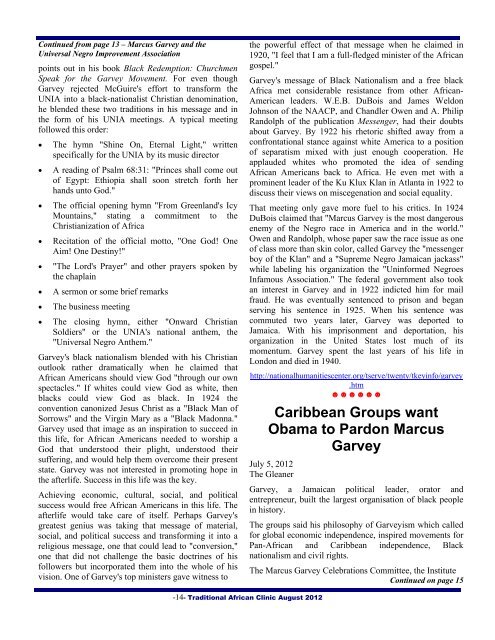African Traditional Herbal Research Clinic ... - Blackherbals.com
African Traditional Herbal Research Clinic ... - Blackherbals.com
African Traditional Herbal Research Clinic ... - Blackherbals.com
You also want an ePaper? Increase the reach of your titles
YUMPU automatically turns print PDFs into web optimized ePapers that Google loves.
Continued from page 13 – Marcus Garvey and the<br />
Universal Negro Improvement Association<br />
points out in his book Black Redemption: Churchmen<br />
Speak for the Garvey Movement. For even though<br />
Garvey rejected McGuire's effort to transform the<br />
UNIA into a black-nationalist Christian denomination,<br />
he blended these two traditions in his message and in<br />
the form of his UNIA meetings. A typical meeting<br />
followed this order:<br />
• The hymn "Shine On, Eternal Light," written<br />
specifically for the UNIA by its music director<br />
• A reading of Psalm 68:31: "Princes shall <strong>com</strong>e out<br />
of Egypt: Ethiopia shall soon stretch forth her<br />
hands unto God."<br />
• The official opening hymn "From Greenland's Icy<br />
Mountains," stating a <strong>com</strong>mitment to the<br />
Christianization of Africa<br />
• Recitation of the official motto, "One God! One<br />
Aim! One Destiny!"<br />
• "The Lord's Prayer" and other prayers spoken by<br />
the chaplain<br />
• A sermon or some brief remarks<br />
• The business meeting<br />
• The closing hymn, either "Onward Christian<br />
Soldiers" or the UNIA's national anthem, the<br />
"Universal Negro Anthem."<br />
Garvey's black nationalism blended with his Christian<br />
outlook rather dramatically when he claimed that<br />
<strong>African</strong> Americans should view God "through our own<br />
spectacles." If whites could view God as white, then<br />
blacks could view God as black. In 1924 the<br />
convention canonized Jesus Christ as a "Black Man of<br />
Sorrows" and the Virgin Mary as a "Black Madonna."<br />
Garvey used that image as an inspiration to succeed in<br />
this life, for <strong>African</strong> Americans needed to worship a<br />
God that understood their plight, understood their<br />
suffering, and would help them over<strong>com</strong>e their present<br />
state. Garvey was not interested in promoting hope in<br />
the afterlife. Success in this life was the key.<br />
Achieving economic, cultural, social, and political<br />
success would free <strong>African</strong> Americans in this life. The<br />
afterlife would take care of itself. Perhaps Garvey's<br />
greatest genius was taking that message of material,<br />
social, and political success and transforming it into a<br />
religious message, one that could lead to "conversion,"<br />
one that did not challenge the basic doctrines of his<br />
followers but incorporated them into the whole of his<br />
vision. One of Garvey's top ministers gave witness to<br />
the powerful effect of that message when he claimed in<br />
1920, "I feel that I am a full-fledged minister of the <strong>African</strong><br />
gospel."<br />
Garvey's message of Black Nationalism and a free black<br />
Africa met considerable resistance from other <strong>African</strong>-<br />
American leaders. W.E.B. DuBois and James Weldon<br />
Johnson of the NAACP, and Chandler Owen and A. Philip<br />
Randolph of the publication Messenger, had their doubts<br />
about Garvey. By 1922 his rhetoric shifted away from a<br />
confrontational stance against white America to a position<br />
of separatism mixed with just enough cooperation. He<br />
applauded whites who promoted the idea of sending<br />
<strong>African</strong> Americans back to Africa. He even met with a<br />
prominent leader of the Ku Klux Klan in Atlanta in 1922 to<br />
discuss their views on miscegenation and social equality.<br />
That meeting only gave more fuel to his critics. In 1924<br />
DuBois claimed that "Marcus Garvey is the most dangerous<br />
enemy of the Negro race in America and in the world."<br />
Owen and Randolph, whose paper saw the race issue as one<br />
of class more than skin color, called Garvey the "messenger<br />
boy of the Klan" and a "Supreme Negro Jamaican jackass"<br />
while labeling his organization the "Uninformed Negroes<br />
Infamous Association." The federal government also took<br />
an interest in Garvey and in 1922 indicted him for mail<br />
fraud. He was eventually sentenced to prison and began<br />
serving his sentence in 1925. When his sentence was<br />
<strong>com</strong>muted two years later, Garvey was deported to<br />
Jamaica. With his imprisonment and deportation, his<br />
organization in the United States lost much of its<br />
momentum. Garvey spent the last years of his life in<br />
London and died in 1940.<br />
http://nationalhumanitiescenter.org/tserve/twenty/tkeyinfo/garvey<br />
.htm<br />
☻☻☻☻☻☻<br />
Caribbean Groups want<br />
Obama to Pardon Marcus<br />
Garvey<br />
July 5, 2012<br />
The Gleaner<br />
Garvey, a Jamaican political leader, orator and<br />
entrepreneur, built the largest organisation of black people<br />
in history.<br />
The groups said his philosophy of Garveyism which called<br />
for global economic independence, inspired movements for<br />
Pan-<strong>African</strong> and Caribbean independence, Black<br />
nationalism and civil rights.<br />
The Marcus Garvey Celebrations Committee, the Institute<br />
Continued on page 15<br />
-14- <strong>Traditional</strong> <strong>African</strong> <strong>Clinic</strong> August 2012
















